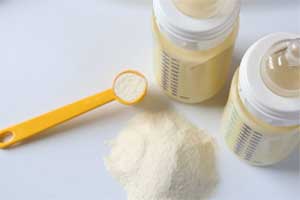- Home
- Editorial
- News
- Practice Guidelines
- Anesthesiology Guidelines
- Cancer Guidelines
- Cardiac Sciences Guidelines
- Critical Care Guidelines
- Dentistry Guidelines
- Dermatology Guidelines
- Diabetes and Endo Guidelines
- Diagnostics Guidelines
- ENT Guidelines
- Featured Practice Guidelines
- Gastroenterology Guidelines
- Geriatrics Guidelines
- Medicine Guidelines
- Nephrology Guidelines
- Neurosciences Guidelines
- Obs and Gynae Guidelines
- Ophthalmology Guidelines
- Orthopaedics Guidelines
- Paediatrics Guidelines
- Psychiatry Guidelines
- Pulmonology Guidelines
- Radiology Guidelines
- Surgery Guidelines
- Urology Guidelines
Modifying baby formula doesn't prevent type 1 diabetes in children

The long-awaited results from the first large international trial to try to prevent type 1 diabetes shows that modified baby formula in which cow's milk proteins have been split does not prevent type 1 diabetes in children with genetic risk factors for the condition, according to researchers at Children's Hospital of Pittsburgh of UPMC, the coordinating center for the U.S. arm of the study. The findings were published in the Journal of the American Medical Association.
Previous studies have reported that early exposure to complex foreign proteins, such as cow's milk proteins, may increase the risk of type 1 diabetes in young children with genetic risk for type 1 diabetes.
In 2002, the research team for TRIGR (Trial to Reduce IDDM in the Genetically at Risk), led in the U.S. by principal investigator Dorothy Becker, M.D., professor of pediatrics at Children's Hospital and the University of Pittsburgh School of Medicine, embarked on a large-scale study of 2,159 infants with a family member affected by type 1 diabetes and with genetic risk for type 1 diabetes to find out whether delaying the exposure to complex foreign proteins such as cow's milk proteins would decrease the risk of diabetes.
After breastfeeding, infants were either weaned to a special formula (extensively hydrolyzed casein formula), with the cow's milk proteins split into small peptides (small pieces of the protein), or a regular cow's milk-based formula with intact cow's milk proteins. Infants were fed the study formula for at least two months until the age of 6 to 8 months and at the same time were given no cow's milk proteins from any other food sources. The children were followed for at least 10 years to determine which children developed diabetes.
At 11.5 years of follow up, weaning to an extensively hydrolyzed casein formula during infancy did not result in a reduction in the incidence of type 1 diabetes compared to regular, intact cow's-milk-based formula.
"After more than 15 years of effort, this study puts to rest the controversy regarding the potential role of cow's milk formula in the development of type 1 diabetes," said Becker. "This once more shows us that there is no easy way to prevent type 1 diabetes. Accordingly, there is no evidence to revise the current dietary recommendations for infants at high risk for type 1 diabetes. We need to chip away at our research efforts around the world to find interventions that may change the pre-diabetes course. Ongoing work of our study is doing just that."

Disclaimer: This site is primarily intended for healthcare professionals. Any content/information on this website does not replace the advice of medical and/or health professionals and should not be construed as medical/diagnostic advice/endorsement or prescription. Use of this site is subject to our terms of use, privacy policy, advertisement policy. © 2020 Minerva Medical Treatment Pvt Ltd